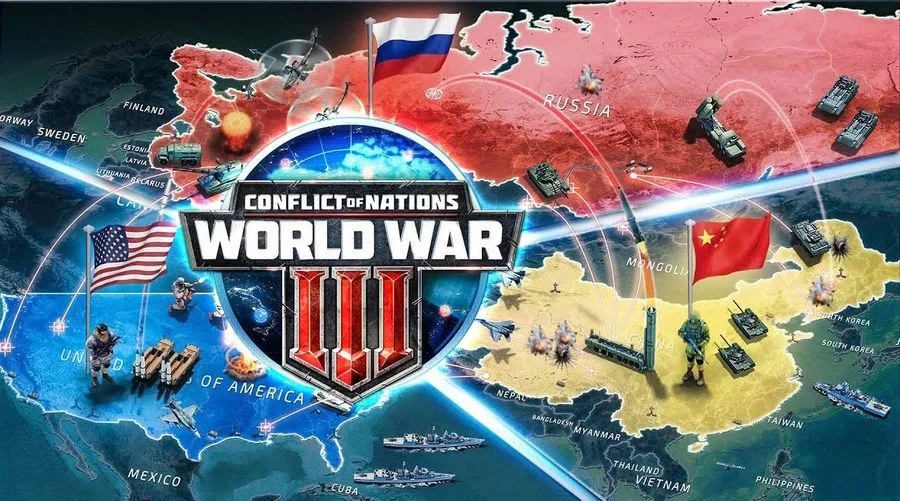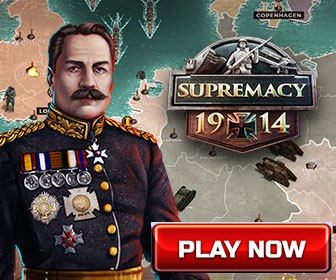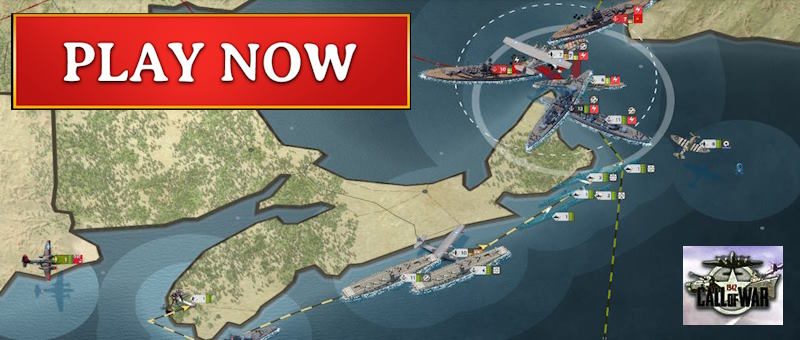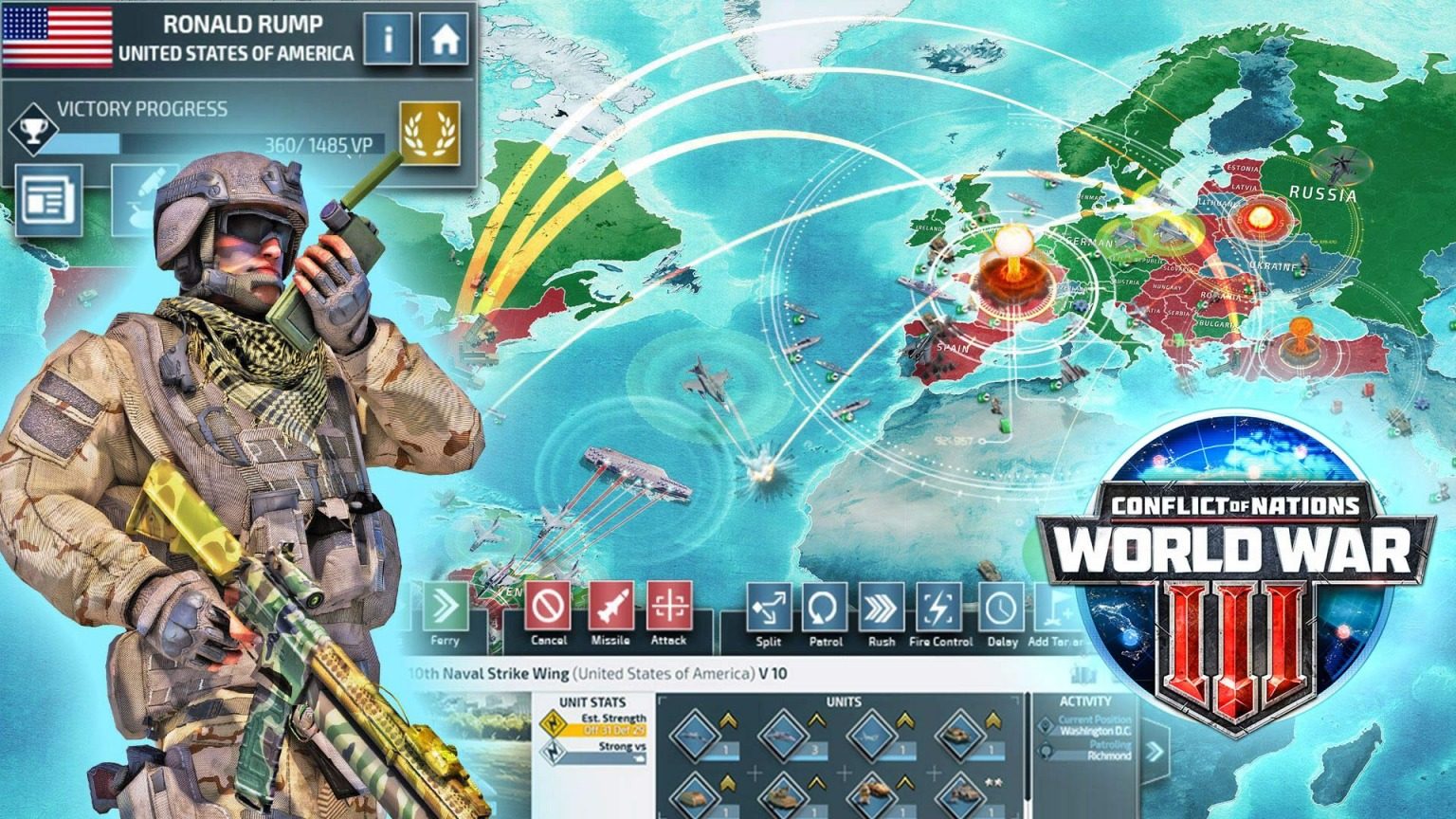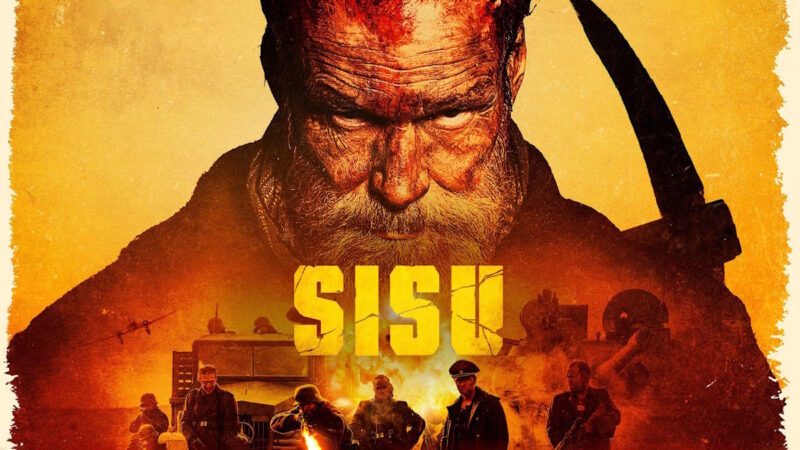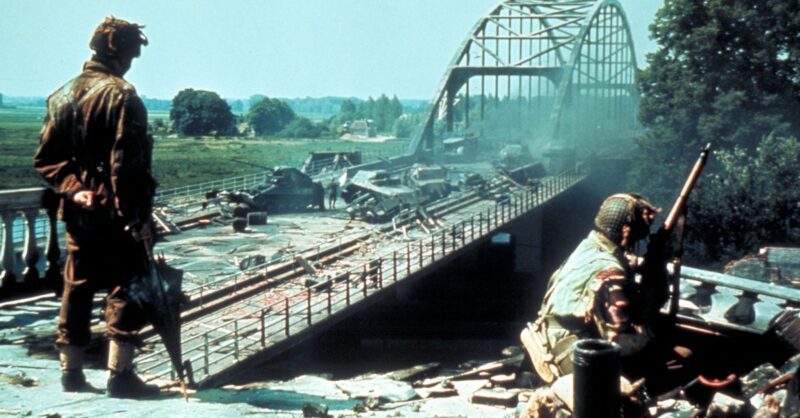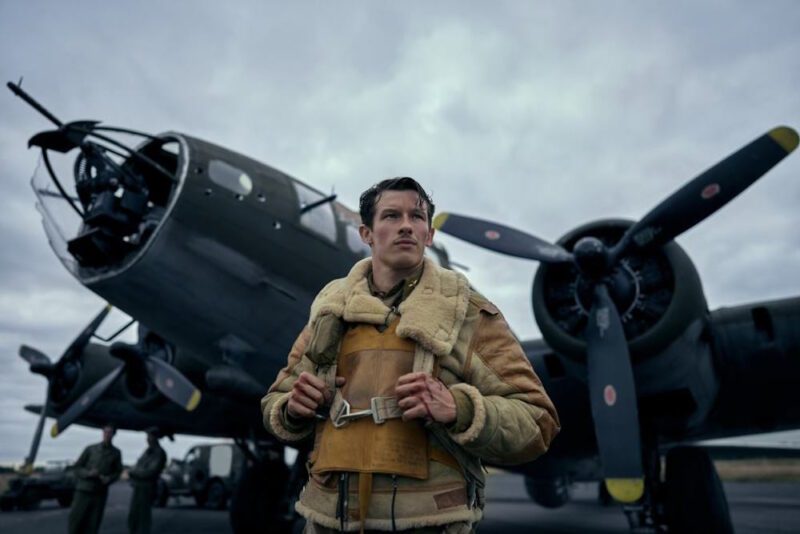Film review ‘Napoleon’ (2023, Ridley Scott): Epic Historical Drama Falls Short of Greatness.
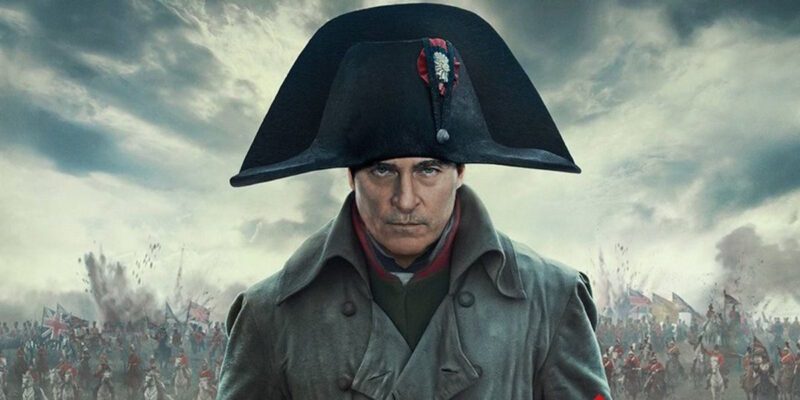
The Epic Historical Drama Falls Short of Greatness
Table of Contents
Ridley Scott’s latest film “Napoleon” hit theaters on November 22, 2023. The movie tells the story of France’s famous emperor and military leader. We found it to be an epic biopic that showcases Scott’s skill at bringing history to life on the big screen.
The film stars Joaquin Phoenix as Napoleon Bonaparte. It follows his rise to power and his rocky relationship with his wife Josephine. Scott recreates Napoleon’s big battles with impressive scale. The movie jumps between action-packed war scenes and more personal moments in Napoleon’s life.
While some critics have called the film bloated, we think it offers an interesting look at a complex historical figure. Scott doesn’t shy away from showing both Napoleon’s military genius and his flaws as a person. The movie gives viewers a lot to think about when it comes to power, ambition, and legacy.
Director and Vision
Ridley Scott brings his signature style to “Napoleon,” crafting an epic that showcases his skill for grand spectacle. We explore how Scott’s vision shapes the film’s approach to history and character.
Ridley Scott’s Filmmaking Style
Scott’s love for big-scale productions shines through in “Napoleon.” We see sweeping battle scenes that fill the screen with hundreds of extras and impressive set pieces. The director’s eye for detail is clear in the period costumes and settings.
Scott uses a mix of wide shots to show the scope of events and close-ups to highlight character emotions. His style brings energy to historical scenes that could feel dry in other hands.
Comparisons to Previous Works
“Napoleon” fits well with Scott’s other historical epics like “Gladiator” and “Kingdom of Heaven.” We notice similar themes of power and ambition running through these films. Scott’s skill at balancing action with character development is on display here too.
The director’s talent for creating memorable visuals is clear. Like in his sci-fi works, Scott builds a world that feels lived-in and real, even in a historical setting.
Historical Authenticity
Scott aims for a mix of historical accuracy and dramatic flair in “Napoleon.” We see careful research in the military tactics and political events shown on screen. The film’s costumes and sets feel true to the time period.
At the same time, Scott takes some creative freedoms to make the story more exciting for modern viewers. He focuses on key moments in Napoleon’s life rather than trying to include every detail.
Synopsis and Historical Context
Napoleon Bonaparte’s rise from a young Corsican officer to Emperor of France shaped European history. His military genius and political ambition fueled a meteoric ascent during a turbulent era.
Early Life and Military Ascent
Napoleon was born in 1769 on the island of Corsica. He joined the French army as an artillery officer at age 16. His tactical skills shone during the French Revolutionary Wars. In 1796, he led the Italian campaign, scoring decisive victories against larger Austrian forces.
These triumphs made Napoleon a national hero. He gained fame for his innovative tactics and ability to inspire troops. By age 30, he had become France’s most celebrated general.
Napoleon’s Political Maneuvering
As his military reputation grew, Napoleon got involved in politics. He joined the coup of 1799 that overthrew the French Directory. This move made him First Consul and de facto leader of France.
Napoleon instituted wide-ranging reforms. He centralized the government, created the Napoleonic Code of civil law, and signed a peace treaty with the Catholic Church. These actions boosted his popularity and consolidated his power.
The Path to Becoming Emperor
In 1804, Napoleon crowned himself Emperor of France. He had transformed the republic into an empire in just five years.
Napoleon expanded French territory through conquest. He defeated Austria, Prussia, and Russia in a series of wars. At its peak, his empire stretched across much of Europe.
But Napoleon’s ambitions led to his downfall. Failed invasions of Spain and Russia weakened his grip on power. In 1814, he was forced to abdicate and was exiled to Elba.
Cast and Characters
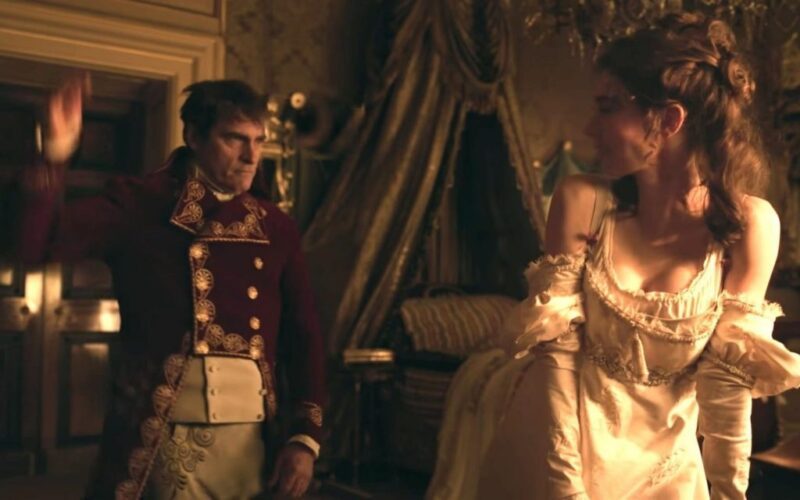
The cast of “Napoleon” brings the historical figures to life with captivating performances. Joaquin Phoenix leads a talented ensemble that breathes new depth into familiar characters from French history.
Joaquin Phoenix as Napoleon
Joaquin Phoenix takes on the role of Napoleon Bonaparte with fierce intensity. His portrayal captures Napoleon’s ambition and strategic brilliance. We see Phoenix convey Napoleon’s complex personality – from charismatic leader to ruthless conqueror.
Phoenix’s physical transformation is striking. He embodies Napoleon’s compact stature and distinctive mannerisms. His performance highlights Napoleon’s inner turmoil and insecurities beneath a confident exterior.
Supporting Cast Highlights
Vanessa Kirby shines as Empress Josephine, Napoleon’s great love and political partner. She brings warmth and wit to the role, holding her own against Phoenix’s domineering Napoleon. Their on-screen chemistry crackles with passion and conflict.
The supporting cast rounds out Napoleon’s world with vivid performances. Tahar Rahim impresses as Paul Barras, the influential politician. Rupert Everett cuts an imperious figure as the exiled Bourbon king Louis XVIII.
Mark Bonnar stands out as Jean-Andoche Junot, Napoleon’s loyal general. The cast skillfully portrays the key figures in Napoleon’s rise to power and eventual downfall.
Released by Apple Original Films
Apple Original Films released “Napoleon” in partnership with Columbia Pictures. The epic historical drama hit theaters on November 22, 2023. This gave moviegoers a chance to see the film on the big screen before its streaming debut.
The theatrical release strategy allows Apple to generate box office revenue. It also builds buzz for the eventual streaming premiere. This approach has worked well for other Apple Original Films like “CODA” and “The Tragedy of Macbeth.”
“Napoleon” marks another high-profile release for Apple’s growing film division. The tech giant has been investing heavily in original content to attract subscribers to Apple TV+. Partnering with acclaimed directors like Ridley Scott helps boost their credibility in the film industry.
Screenplay and Storyline
David Scarpa wrote the screenplay for “Napoleon” (2023). He teamed up with director Ridley Scott again after their work on “All the Money in the World” (2017).
The film covers Napoleon Bonaparte’s rise to power during the French Revolution. It starts with the Siege of Toulon in 1793, where Napoleon first gains recognition as a military leader.
We see Napoleon’s journey from a young officer to Emperor of France. The story follows his military campaigns and political maneuvers. It also explores his relationship with Joséphine de Beauharnais.
Scarpa’s script balances battlefield action with personal drama. We witness Napoleon’s strategic brilliance in war scenes. We also get glimpses of his complex personality off the field.
The screenplay doesn’t shy away from showing Napoleon’s flaws. It portrays him as both a military genius and a sometimes petulant character. This adds depth to the historical figure.
Key Historical Events
Napoleon’s rise and fall are marked by pivotal battles that shaped European history. These events showcase his military genius and eventual downfall on the battlefield.
Siege of Toulon and Early Triumphs
In 1793, Napoleon first gained fame at the Siege of Toulon. As a young artillery officer, he devised a plan to capture the city from British forces. His success led to a promotion and more victories.
Napoleon’s early wins in Italy and Egypt built his reputation. He returned to France as a hero and took power in a coup. These events set the stage for his later conquests across Europe.
The Battle of Austerlitz as a Cinematic Spectacle
The Battle of Austerlitz in 1805 was Napoleon’s greatest victory. He defeated larger Austrian and Russian armies with clever tactics. The film shows this battle in grand scale.
We see Napoleon’s famous “Sun of Austerlitz” moment. He waits for fog to clear before attacking. The battle scenes are big and impressive, with thousands of extras and special effects.
The Downfall at Waterloo
Napoleon met his final defeat at Waterloo in 1815. The movie depicts this battle as the end of an era. We watch as Napoleon’s forces clash with the allied armies led by the Duke of Wellington.
The film shows Napoleon’s last stand and eventual surrender. It marks the end of his rule and his exile to Saint Helena. This battle closes the chapter on Napoleon’s military career and empire.
Cinematography and Visuals
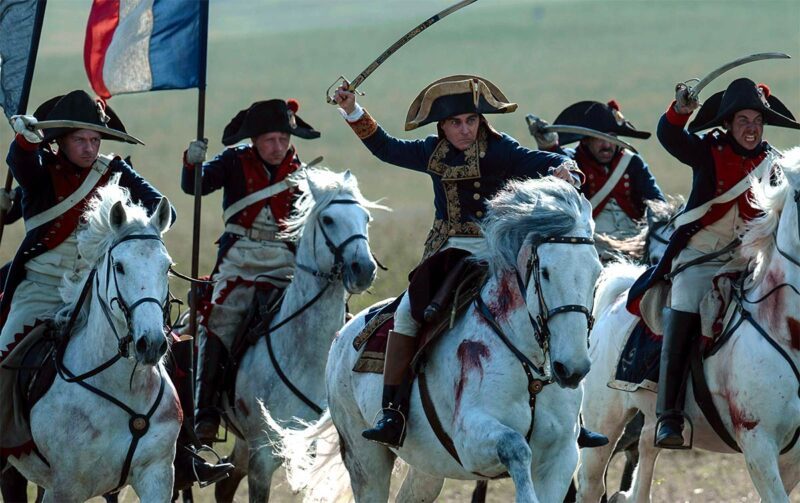
The cinematography in “Napoleon” is visually striking. We were impressed by the grand scale of the battle scenes. Scott’s camera work captures the chaos and brutality of warfare in vivid detail.
Sweeping shots of landscapes add to the epic feel. The film showcases beautiful vistas of Europe, from snowy mountains to lush countryside. These scenic views provide a stunning backdrop for Napoleon’s military campaigns.
The lighting and color palette shift to match the mood of different scenes. Warm, golden hues appear in opulent palace interiors. Cooler blues and grays dominate the gritty battlefield sequences.
Close-up shots bring us face-to-face with the characters. We can see every wrinkle and expression on Napoleon’s face as he plots his next move. This intimate camera work helps us connect with the historical figures on screen.
Some of the standout visual moments include:
- The smoky, fiery chaos of cannon fire
- Troops marching across vast, empty plains
- Ornate costumes and set designs
- Snow-covered battlefields littered with fallen soldiers
While not perfect, the film’s cinematography succeeds in bringing Napoleon’s world to life before our eyes.
Music and Score
Martin Phipps composed the music for “Napoleon.” He’s known for his work on “The Crown” and other historical dramas. Phipps recorded the score in London last fall.
The soundtrack aims to capture Napoleon’s life and times. It blends classical and modern elements to create a unique sound. We found the music enhances the film’s epic scope and emotional moments.
Phipps uses orchestral instruments to build tension and drama. The score swells during battle scenes, adding excitement. In quieter parts, it becomes more subtle, reflecting Napoleon’s inner thoughts.
We noticed how the music changes with Napoleon’s fortunes. It’s triumphant when he’s winning and somber when he faces defeat. This helps us connect with the character’s journey.
The soundtrack album came out on November 24, 2023. It lets viewers relive the film’s powerful musical moments. We think Phipps’ score adds depth to Scott’s vision of Napoleon’s life.
Cultural Impact and Reception
“Napoleon” sparked debate among critics and historians. Many praised Joaquin Phoenix’s performance as the French leader. Some found the film’s historical accuracy lacking.
Reviews were mixed. On Rotten Tomatoes, the movie earned a 59% critic score. Audiences rated it higher at 77%. Critics admired the grand battle scenes and lavish production design.
We noticed historians took issue with certain portrayals. They pointed out inaccuracies in Napoleon’s personal life and military campaigns. This led to discussions about balancing entertainment with historical truth in biopics.
Public reception varied. Some viewers enjoyed the epic scale and dramatic storytelling. Others felt the film didn’t fully capture Napoleon’s complexity. The movie’s runtime of over 2.5 hours drew both praise and criticism.
“Napoleon” reignited interest in the historical figure. It prompted conversations about leadership, power, and European history. The film’s release led to increased book sales and museum visits related to Napoleon Bonaparte.
Social media buzzed with memes and discussions about the movie. This online engagement helped spread awareness and keep “Napoleon” in the public eye for weeks after its release.
Marketing and Distribution
We saw Sony Pictures pull out all the stops to promote “Napoleon.” They used eye-catching posters and trailers to grab attention. The film’s epic scale was front and center in the marketing.
TV spots highlighted the battle scenes and Joaquin Phoenix’s performance. Online ads targeted history buffs and action movie fans alike.
Sony offered special subscription deals to see the film in theaters. Some packages included extras like behind-the-scenes content.
Print ads appeared in magazines and newspapers. They focused on the visual spectacle and star power of the movie.
The studio aimed for a wide release in many countries. This helped build buzz and box office momentum globally.
We noticed Sony’s marketing leaned into the controversy around historical accuracy. This sparked debates that kept people talking about the film.
Social media played a big role too. Clips and memes spread quickly online, raising awareness among younger viewers.
Overall, Sony’s campaign tried to position “Napoleon” as a must-see event film.
Audience Engagement
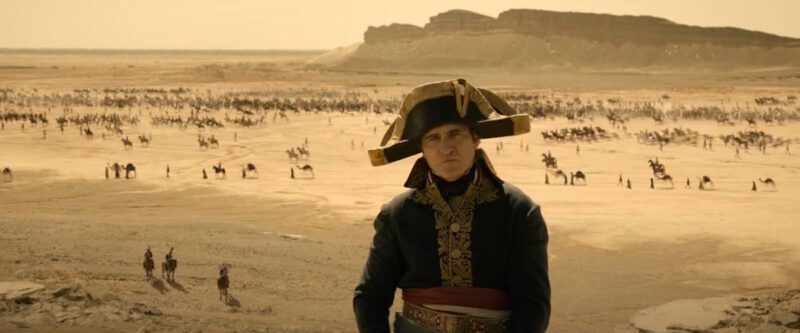
“Napoleon” has sparked much discussion among moviegoers. We’ve seen varied reactions from audiences. Some praise the film’s grand battle scenes and Joaquin Phoenix’s performance. Others find it slow-paced at times.
The movie’s historical accuracy has been debated online. Many viewers have turned to books and articles to learn more about Napoleon’s life. This shows the film has piqued interest in French history.
Cinema attendance for “Napoleon” has been strong in its opening weeks. The epic scale of the movie seems best suited for the big screen. We’ve noticed many people opting to see it in theaters rather than waiting for streaming.
Offers and promotions have helped boost ticket sales. Some theaters have run special “Napoleon” themed events. These include French cuisine nights and historical talks before screenings.
Social media buzz around the film remains high. Fans are sharing their favorite quotes and scenes online. We’ve also seen heated debates about the portrayal of Napoleon’s relationship with Josephine.
To stay updated on “Napoleon” and other films, movie buffs can subscribe to various cinema newsletters. These often include exclusive content and early access to tickets for upcoming releases.
Behind the Scenes
We got a peek behind the curtain of Ridley Scott’s epic “Napoleon” film. The production team at Scott Free Productions pulled out all the stops to bring this historical drama to life.
The battle scenes were a major focus. Ridley Scott personally oversaw the recreation of Napoleon’s famous victories. He worked closely with historians to ensure accuracy in the details.
Thousands of extras were employed to portray soldiers in massive battle sequences. The costume department had their work cut out for them, crafting period-accurate uniforms for the huge cast.
Special effects played a big role too. The team used a mix of practical effects and CGI to create realistic 19th century warfare on screen. Explosions, cannon fire, and cavalry charges were all meticulously planned.
Joaquin Phoenix, who plays Napoleon, underwent extensive preparation for the role. He studied Napoleon’s mannerisms and speech patterns to truly embody the famous French leader.
The film was shot on location in various parts of Europe. This gave the production an authentic backdrop for Napoleon’s story. The crew faced challenges working in different countries, but the results speak for themselves.
Historical Analysis
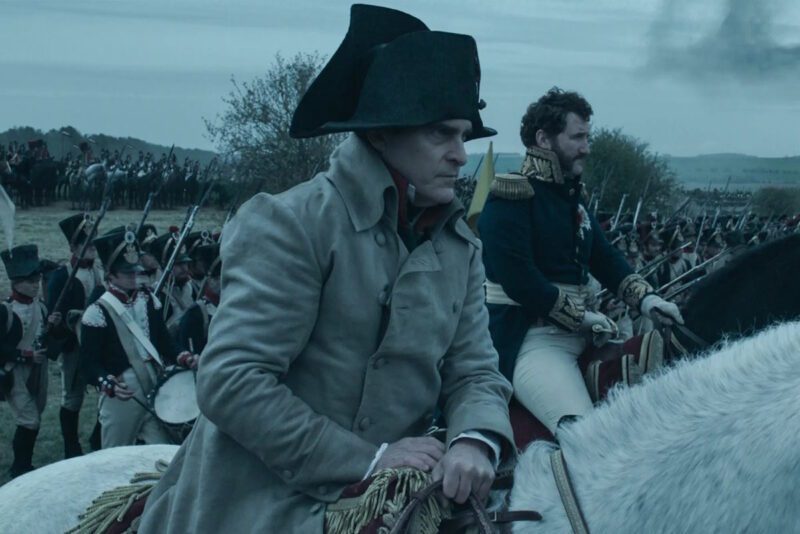
Ridley Scott’s “Napoleon” offers a glimpse into the life of one of history’s most famous figures. We found the film takes some liberties with historical facts. While it captures the broad strokes of Napoleon’s rise and fall, it simplifies complex events.
The movie highlights Napoleon’s major military campaigns. We see depictions of his victories at Austerlitz and Toulon. These scenes showcase his tactical genius, though they’re condensed for dramatic effect.
Napoleon’s personal life gets significant screen time. His relationship with Josephine is a key focus. The film portrays their passionate but turbulent marriage.
Historians might take issue with some aspects of the movie. It skims over important political developments of the era. The complexities of the French Revolution are barely touched upon.
We noticed the film paints Napoleon in a somewhat sympathetic light. It doesn’t deeply explore criticisms of his rule or the negative impacts of his conquests.
For viewers interested in Napoleon’s life, the movie provides a starting point. But it shouldn’t be seen as a substitute for historical research. It’s more of an interpretation than a strict retelling of facts.
Themes and Motifs
Napoleon explores several key themes throughout its epic runtime. We see the constant push and pull between warmongering and peace as Bonaparte rises to power through military conquest.
Power drives much of the narrative. Napoleon’s relentless ambition propels him from a lowly officer to emperor of France. But this pursuit of power often comes at a cost to those around him.
The film also weaves in elements of romance, particularly through Napoleon’s tumultuous relationship with Josephine. Their passionate but complicated love story adds depth to the historical drama.
Cruelty emerges as another motif. We witness Napoleon’s harsh treatment of enemies and even allies at times. This reflects the brutal realities of war and empire-building in that era.
The contrast between Napoleon’s military genius and personal flaws creates an intriguing character study. We see moments of tactical brilliance on the battlefield juxtaposed with petty outbursts in his private life.
Scott’s direction emphasizes the spectacle of Napoleon’s campaigns. Sweeping battle scenes showcase the massive scale of conflict while also highlighting its human toll.
Impact on Modern Cinema
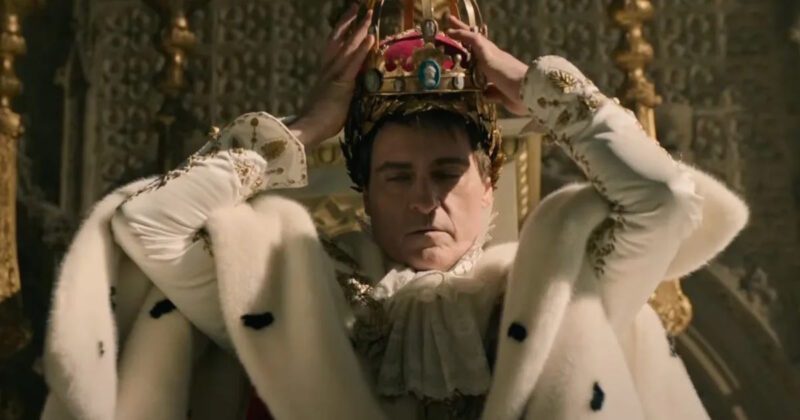
“Napoleon” joins the ranks of epic historical films that shape modern cinema. We see its influence in several key areas:
Scale and spectacle: The movie’s grand battle scenes set a new bar for historical epics. They remind us of classics like Kubrick’s “Spartacus” in their sheer scope.
Visual effects: Scott’s use of cutting-edge technology pushes boundaries. It shows how modern tools can bring history to life on screen.
Character depth: The focus on Napoleon’s personal life adds layers to the historical figure. This approach may inspire future biopics to delve deeper into their subjects’ psyches.
Period accuracy: The attention to detail in costumes and sets raises audience expectations. It challenges other filmmakers to match this level of authenticity.
We expect “Napoleon” to spark renewed interest in historical dramas. Its blend of action and character study could inspire a new wave of nuanced biopics.
The film’s marketing strategy and release model may also influence how studios promote big-budget historical movies. Its success or failure could shape future decisions about similar projects.
How does the 2023 ‘Napoleon’ movie compare to previous films about Napoleon Bonaparte?
Scott’s “Napoleon” stands out for its grand battle scenes and focus on Napoleon’s relationship with Josephine. It takes a different approach from older films by portraying Napoleon as more of a flawed, sometimes comical figure.
What has been the general reaction in France to the release of Ridley Scott’s ‘Napoleon’?
The reaction in France has been mixed. Some French critics praised the film’s visual spectacle, while others took issue with historical inaccuracies and the portrayal of Napoleon as less heroic than in traditional French narratives.


